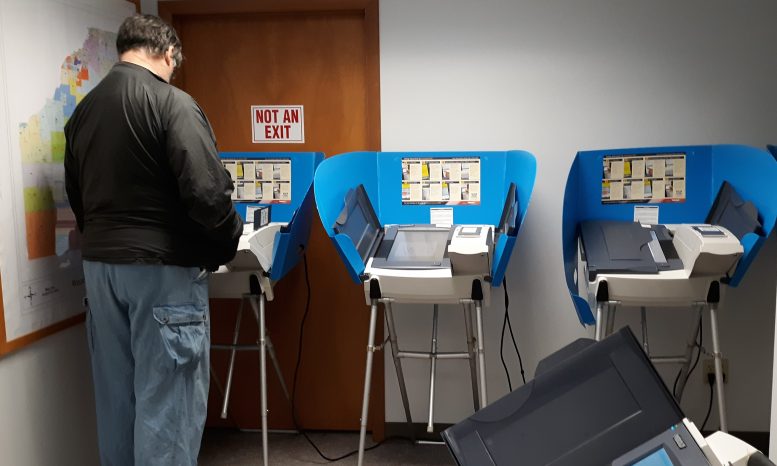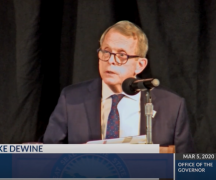Ohio Gov. Mike DeWine on Thursday said he did not agree with a decision by the legislature, which is controlled by his fellow Republicans, not to pay postage on mail-in ballots.
Amid the coronavirus pandemic, Ohioans are expected to rely heavily on mail-in voting as they did in the primary. But as officials prepare for such an election, bipartisan and nonpartisan advocates have said the state should pay for postage.
“No Ohioan should have to pay or travel across their county just to cast a ballot — and making voting by mail more accessible is crucial to ensuring that every voter is able to cast a ballot this November,” the nonpartisan League of Women Voters of Ohio said last week in an action alert.
The alert was aimed at getting officials to prepay postage on absentee ballots and to allow for more than a single ballot drop-box in each of Ohio’s 88 counties. Republican Secretary of State Frank LaRose issued an order limiting the number of drop boxes, saying that’s what the law required. But Franklin County Common Pleas Judge Richard Frye on Tuesday ruled that LaRose’s claim has no legal basis.
Some critics say that things like making voters pay postage or drive long distances to vote make it harder for the poor, who tend to vote Democratic, to cast votes.
Even though he has voted by mail himself, President Donald Trump has repeatedly attacked mail-in voting as prone to fraud.
But this spring he hinted at a more partisan motive. He said if it and early voting were expanded “you’d never have a Republican elected in this country again.”
Then in August, Trump admitted that his administration was choking off cash to the United States Postal Service to dampen mail-in voting.
By contrast, Ohio Democrats — and many prominent Republicans — have said that especially amid a pandemic, mail-in voting is a safe way to engage in the democratic process.
“The need for safe and secure elections exists in every election cycle, but the needs are different and greater during a pandemic,” state Rep. Michele Lepore-Hagan, D-Youngstown, said in a press release Monday. “Secretary LaRose has the ability to pay return postage on absentee ballots, keeping Ohioans safe if they wish to vote from home. Securing our election this November requires him to take action now. Anything short of that is voter suppression.”
LaRose had asked the Ohio Controlling Board, which provides legislative oversight of spending, for $3 million to pay for postage on absentee ballots.
But before the board met on Monday, Ohio Senate President Larry Obhof, R-Medina, switched out a Republican lawmaker on the panel who favored prepaid ballots for one who opposed it. That enabled the GOP-controlled body to kill the proposal.
The decision was not what two former Ohio governors wanted.
“Voting is not a Democrat or Republican issue — it’s an American issue,” former Govs. Bob Taft, a Republican, and Richard Celeste, a Democrat, wrote to the controlling board last week, according to the Associated Press. “That is why, when the world is facing a pandemic, we must show the courage to take additional steps to empower voters seeking to exercise their sacred right.”
In a press conference Thursday, DeWine was asked if he agreed with the decision not to pay for postage.
“No,” he said. “I’m on the other side of that, but it was clear to me some time ago that there was not an appetite in the General Assembly to do that. In fact, there were members of the General Assembly who were not in favor of doing that.”
But the governor said he still believed the state was on track to holding a fair election.
“I think we’re doing a good job in Ohio of letting everybody vote and make it as broad as we can and giving them every opportunity,” he said.
***
Also from Ohio Capital Journal:
Ohio joins other states in refusing to foot the bill for ballot postage
WASHINGTON — Ohio Democrats are fuming over a recent decision to levy what they call a “modern-day poll tax” on voters this fall: the cost of the stamps needed to mail a ballot.
The state’s GOP-led Controlling Board this week rejected a $3 million proposal to pay for postage on absentee ballots and ballot application forms. The board, an agency of the Ohio Office of Budget and Management, oversees state agencies’ capital and operating expenditures.
The move means that Ohioans, like many other Americans, will have to buy postage in order to exercise their right to vote, in a year expected to see a huge surge in mail-in voting due to the pandemic. But how many stamps Ohio voters will need has not been specified by the secretary of state’s office. “The amount of stamps varies on the size of the ballot. We encourage voters to contact their board of elections with any questions they may have,” said Maggie Sheehan, a spokesperson for the secretary of state’s office. READ MORE
What’s going on with all the Ohio elections lawsuits? An explainer
Courtroom battles. Victories and appeals. Allegations of a judicial conspiracy.
Political parties are involved in a flurry of Ohio lawsuits surrounding the 2020 General Election before the first votes here have been cast.
The Ohio Democratic Party and other voter advocacy groups have filed lawsuits against Secretary of State Frank LaRose seeking to change certain aspects of how the election will be conducted.
Republican interests — including the Trump reelection campaign — have filed to intervene in each case, arguing any changes enacted could lead to a competitive disadvantage.
Here is an explainer of what the cases are about, and how the results may affect Ohio voters this election season: READ MORE





